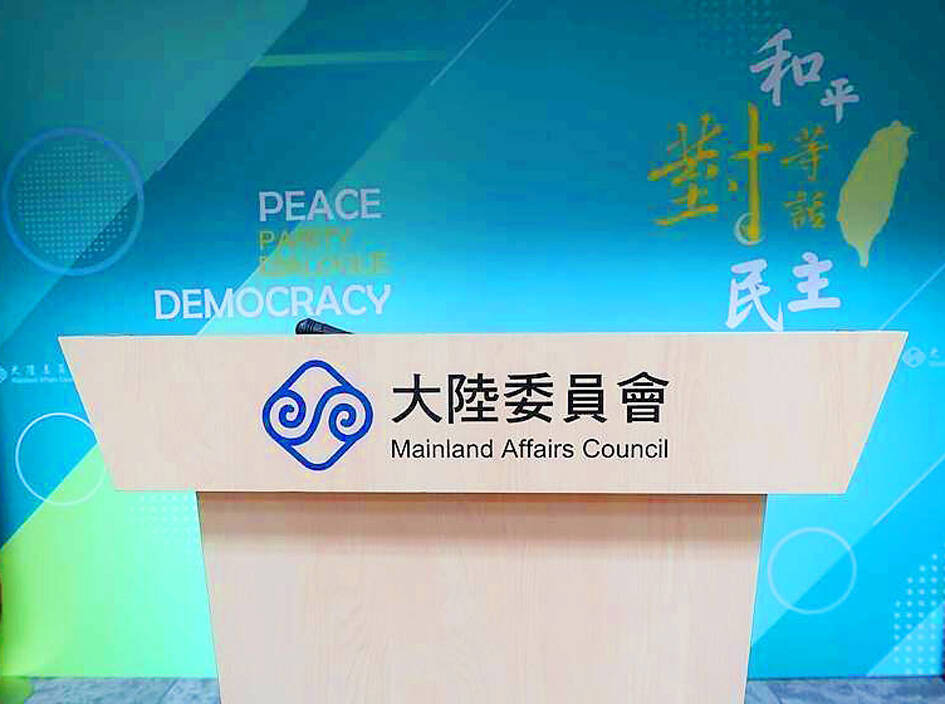China is continuing to use “gray zone” tactics to cause social division in Taiwan and alter the “status quo” in the Taiwan Strait, a report commissioned by the Mainland Affairs Council (MAC) found.
The council said the academic report it commissioned to analyze the state of Taiwan-China-US relations found that China is continuing to use legal loopholes, psychological warfare and “gray zone” tactics in an attempt to change public opinion in Taiwan and alter the “status quo” across the Taiwan Strait.
At the same time, the US is promoting trade and military exchanges with Taiwan, managing competition risks with China and boosting integration with Indo-Pacific allies to deter China, it said, citing the report.

Photo: Chung Li-hua, Taipei Times
Following Vice President William Lai’s (賴清德) win in the presidential election in January, China poached former Taiwan ally Nauru, used unregistered boats on numerous occasions to make incursions into Taiwan’s waters, and unilaterally changed the flight path of route M503 to bring it closer to the median line of the Taiwan Strait, the council said, adding that these actions were intended to alter public sentiment in Taiwan.
“Even after the large earthquake that struck Hualien on April 3 China flew military aircraft into airspace near Taiwan,” it said.
At the same time as it shows aggression toward Taiwan, Beijing invites opposition-party politicians to China for discussions in a bid to find Taiwanese to endorse its Taiwan strategy, the council said.
When Chinese President Xi Jinping (習近平) met former president Ma Ying-jeou (馬英九) on April 10, Xi spoke in a soft tone — something he has rarely done recently — while emphasizing national integration and cross-strait exchanges, the council said.
While Beijing continues to suppress Taiwan diplomatically, it also uses economic tactics such as tariffs and trade barriers that affect Taiwan’s exports, it said.
These actions combined with frequent “gray zone” incursions using fishing boats and civilian aircraft also challenge the US’ response measures, and repeatedly test Taiwan’s jurisdiction and legal discourse, the council said.
“China has sent a very clear signal, which is that it aims to encourage more Taiwanese to support its vision of integration and to promote a process of so-called peaceful reunification,” it said.
Anyone who is willing to agree with Beijing’s “one China” principle would be rewarded through exchanges with China, it said.
“China has no desire to improve relations with Taiwan’s ruling Democratic Progressive Party (DPP),” the council said “It is likely that China will continue to create problems for the DPP in a bid to continue sowing social division.”

The combined effect of the monsoon, the outer rim of Typhoon Fengshen and a low-pressure system is expected to bring significant rainfall this week to various parts of the nation, the Central Weather Administration (CWA) said. The heaviest rain is expected to occur today and tomorrow, with torrential rain expected in Keelung’s north coast, Yilan and the mountainous regions of Taipei and New Taipei City, the CWA said. Rivers could rise rapidly, and residents should stay away from riverbanks and avoid going to the mountains or engaging in water activities, it said. Scattered showers are expected today in central and

COOPERATION: Taiwan is aligning closely with US strategic objectives on various matters, including China’s rare earths restrictions, the Ministry of Foreign Affairs said Taiwan could deal with China’s tightened export controls on rare earth metals by turning to “urban mining,” a researcher said yesterday. Rare earth metals, which are used in semiconductors and other electronic components, could be recovered from industrial or electronic waste to reduce reliance on imports, National Cheng Kung University Department of Resources Engineering professor Lee Cheng-han (李政翰) said. Despite their name, rare earth elements are not actually rare — their abundance in the Earth’s crust is relatively high, but they are dispersed, making extraction and refining energy-intensive and environmentally damaging, he said, adding that many countries have opted to

FORCED LABOR: A US court listed three Taiwanese and nine firms based in Taiwan in its indictment, with eight of the companies registered at the same address Nine companies registered in Taiwan, as well as three Taiwanese, on Tuesday were named by the US Department of the Treasury’s Office of Foreign Assets Control (OFAC) as Specially Designated Nationals (SDNs) as a result of a US federal court indictment. The indictment unsealed at the federal court in Brooklyn, New York, said that Chen Zhi (陳志), a dual Cambodian-British national, is being indicted for fraud conspiracy, money laundering and overseeing Prince Holding Group’s forced-labor scam camps in Cambodia. At its peak, the company allegedly made US$30 million per day, court documents showed. The US government has seized Chen’s noncustodial wallet, which contains

SUPPLY CHAIN: Taiwan’s advantages in the drone industry include rapid production capacity that is independent of Chinese-made parts, the economic ministry said The Executive Yuan yesterday approved plans to invest NT$44.2 billion (US$1.44 billion) into domestic production of uncrewed aerial vehicles over the next six years, bringing Taiwan’s output value to more than NT$40 billion by 2030 and making the nation Asia’s democratic hub for the drone supply chain. The proposed budget has NT$33.8 billion in new allocations and NT$10.43 billion in existing funds, the Ministry of Economic Affairs said. Under the new development program, the public sector would purchase nearly 100,000 drones, of which 50,898 would be for civil and government use, while 48,750 would be for national defense, it said. The Ministry of